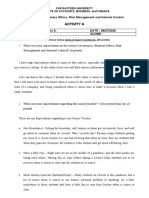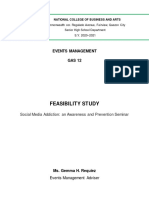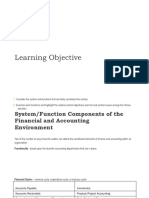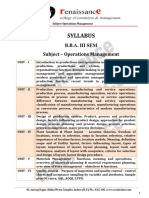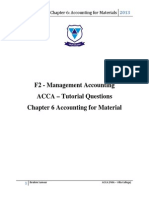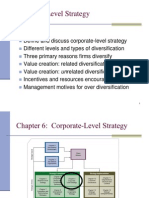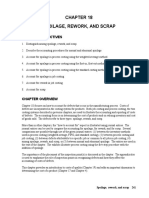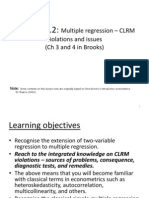Week 1
Week 1
Uploaded by
Athena CandiceCopyright:
Available Formats
Week 1
Week 1
Uploaded by
Athena CandiceOriginal Title
Copyright
Available Formats
Share this document
Did you find this document useful?
Is this content inappropriate?
Copyright:
Available Formats
Week 1
Week 1
Uploaded by
Athena CandiceCopyright:
Available Formats
RIZAL TECHNOLOGICAL UNIVERSITY
Cities of Mandaluyong and Pasig
HR-ELEC101
Events Management
Student Name
Section
Schedule
Program BSBA Human Resources Development Management
College College of Business and Entrepreneurial Technology
Professor
Module Duration
1ST SEMESTER I 2020 - 2021
RIZAL TECHNOLOGICAL UNIVERSITY
Cities of Mandaluyong and Pasig
SESSION NO. / WEEK NO. 1
MODULE NO. 1: Principles of Events Management
Topics covered in this module includes:
1. Pre-event Planning
2. Determining and Acquiring the Security Workforce
3. Communications and Communication Technology
4. Surveillance and Observation
5. Fire/EMS/Medical Care and Emergency Response
6. Physical Facilities Inspection
7. Process of Risk Management
8. Crisis Management
9. Leadership and Participant Management
10. Task Management
11. Managing Temporary and Diverse Teams
Overview
Proper event safety and security must be tailored to each specific event and
potential exposure. This loss control alert provides a framework to support safety and
security planning by offering a series of topic-specific questions. Answers to these
questions will assist in crafting an effective safety and security plan. It is not a
comprehensive list of everything that must be considered. Some events, by their very
size and nature will require additional safety and security measures beyond what is
discussed here. You are encouraged to seek additional information and professional
resources.
HR-ELEC101: Events Management 2
RIZAL TECHNOLOGICAL UNIVERSITY
Cities of Mandaluyong and Pasig
Study Guide
How the learners will complete the module:
• Participation in the introductory discussion via Google Meet/Zoom
• Modular integration and assessment activities
• Completion of case studies
• Accomplishment of the final assessment exam.
This module is divided into these parts:
• Overview
• Learning Outcomes
• Topic Presentation
• Guided Exercises/Learning Activities
• Assessment
Learning Outcomes
At the end of this module, the learner will be able to:
1. Know the definition, need and importance of events
2. Discuss the term event management
3. Identify the steps involved in event management procedures
4. Explain the concept of an event
5. Know and tell the size of an event
6. Understand Event Management, its history and background, its categories
and types and its roles in the society.
7. Differentiate Event Management from Event Planning and Project
Management
8. Assess the feasibility of managing an event
9. Know how to design an Event Plan.
HR-ELEC101: Events Management 3
RIZAL TECHNOLOGICAL UNIVERSITY
Cities of Mandaluyong and Pasig
Topic Presentation
EVENTS Acronym
E – Entertainment (Events include entertainment with fun, games and information)
V – Venue (Place for conducting the event successfully)
E – Equipment (Technical and non-technical equipment, used to run the show
successfully)
N – News (News about a new product, movie, activity or offer)
T – Team (Event involves integrated effort of individuals)
S – Strategy (Various strategies used like financial, marketing, technical and human
resources strategy)
What is Events Management?
Event management is an application of project management to the creation
development and execution of events. It is the planning and management of an event
or activity. It involves studying the intricacies of the brand, identifying the target
audience, devising the event concept, planning the logistics and coordinating the
technical aspects before actually executing the moralities of the proposed event.
Event management requires strong organizational communication, negotiation,
budgeting and creative skills.
Business Event Management is the practice of incorporating business logic into
labelling events, communicating events and managing events. It requires a profound
interaction and cooperation among business stake holders, customers, as well as IT
and management professionals when designing, implementing and maintaining
processes.
Concept of Event Management
The concept of event management is all about applying project management to the
creation and development of festivals, events and conferences. It focuses on
studying the intricacies of the brand, recognizing the target audience, devising the
event concept, planning the logistics and coordinating the technical aspects prior to
HR-ELEC101: Events Management 4
RIZAL TECHNOLOGICAL UNIVERSITY
Cities of Mandaluyong and Pasig
actually executing the modalities of the proposed event. Post-event analysis and
ensuring a return on investment have become chief drivers for the event industry.
Historical Perspective
During the Victorian Period “expert advice” was given by the “Dancing Master.” This
individual would be employed to provide the festivities with style and elegance. The
Greek or Roman Gladiator Games would employ large numbers of individuals who
would take months to plan the many details of the various games and entertainment.
Event management is the application of project management to the creation and
development of large scale events such as festivals, conferences, ceremonies,
formal parties, concerts, or conventions. It involves studying the brand, identifying the
target audience, devising the event concept, and coordinating the technical aspects
before actually launching the event.
The process of planning and coordinating the event is usually referred to as event
planning and which can include budgeting, scheduling, site selection, acquiring
necessary permits, coordinating transportation and parking, arranging for speakers or
entertainers, arranging decor, event security, catering, coordinating with third party
vendors, and emergency plans.
The events industry now includes events of all sizes from the Olympics down to
business breakfast meetings. Many industries, charitable organizations, and interest
groups hold events in order to market themselves, build business relationships, raise
money, or celebrate achievement.
Nature and Scope of Events Management
Event management demands a lot of hard work and efforts to get the client base for
the events. Event management is a process of organizing a focused and professional
event, for a particular target audience. Event management is the most profound form
of advertising and marketing which is full of glamorous and thrilling profession now
days. Planning is one of the most important elements of event management you can
say or is planning an event in itself. It gives benefits to event managers by event
advertising, it promotes the publicity of event. It gives benefits to advertising
companies through communicating source with the public, introduction of new
products to public. Event management provides a wide variety of career that could be
HR-ELEC101: Events Management 5
RIZAL TECHNOLOGICAL UNIVERSITY
Cities of Mandaluyong and Pasig
anything from concerts, product launches, conferences, promotions, press
conferences, jubilee celebrations and farewells to television-based events, fashion
shows, wedding or parties. The event management industry is characterized by the
presence of a small number of dominant large players and a greater number of
smaller outfits. Unfortunately, the industry is too young to offer a predetermined
career path.
Events are great ways to educate your community, grow your local
movement, and influence decision-makers. In this, about public events primarily,
such as rallies, concerts, walks, and forums, though many of the same concepts
apply whether you’re hosting a house party, or a march.
The Roles of Events in Society
Social
The social element of events provides an opportunity for individuals to interact,
develop tradition, strengthen and bond the community, create a community identity,
increase awareness of diverse cultural environments, in-still pride and patriotism.
Political
Political events signify and demonstrate power and popularity, provide a forum for
civic celebrations, to acknowledge accomplishments, to reinforce traditions, influence
public opinion and perception.
Economic
Events play a role in the financial success of a community by providing employment,
the creation of legacies, attracting tourists, influencing spending and providing
charities with fundraising means.
What is an Event?
There were several definitions for an event:
1. An event is a general term indicating the coming together of a number people
in place, to confer or carry out a particular activity.
HR-ELEC101: Events Management 6
RIZAL TECHNOLOGICAL UNIVERSITY
Cities of Mandaluyong and Pasig
2. Event can refer to a phenomenon, any observable occurrence, or an
extraordinary occurrence.
3. Events as occurrences designed to communicate particular messages to
target audiences. – (Philip Kotler)
Events can also be defined as something noteworthy that happens according to a set
plan involving networking of a multimedia package thereby achieving the client’s
objective and justifying their need of associating with events.
Event Management is the process of analyzing, planning, marketing, producing and
evaluating an event. It is a different way of promoting a product, service or idea. If an
event is managed efficiently and effectively, it can be used as a very powerful
promotional tool to launch or market a product or service. Events Management
requires certain core values to be deployed to every element, process and decision
to justify professional approach and achieve effective and efficient results. The
process of planning and coordinating the event is usually referred to as event
planning and which can include budgeting, scheduling, site selection, acquiring
necessary permits, coordinating transportation and parking, arranging for speakers or
entertainers, arranging decor, event security, catering, coordinating with third party
vendors, and emergency plans. The events industry now includes events of all sizes
from the Olympics down to business breakfast meetings. Many industries, charitable
organizations, and interest groups hold events in order to market themselves, build
business relationships, raise money, or celebrate achievement.
Importance of Events
The purpose of the event should drive all the planning.
Example: if you were running a conference for financial planners there could be two
quite different purposes:
1. To facilitate an exchange of information, bringing participants up-to-date with
the latest changes in financial planning software products.
2. To achieve a memorable out-of-body experience for financial planners in
order to develop a positive association with a new software product.
HR-ELEC101: Events Management 7
RIZAL TECHNOLOGICAL UNIVERSITY
Cities of Mandaluyong and Pasig
Four Categories of Events
1. Leisure Events
Leisure event management is an interesting and diverse field. It involves managing
facilities like sports grounds, recreation centers, parks and entertainment venues.
Also, it can involve managing a celebration or festival, sporting contest or concert.
2. Cultural Events
Often, cultural events are meant to enrich the cultural standing of the city in which
they are held. Cultural events teams create unique festivals, memorable outdoor
spectacles, accessible entertainment and unexpected arts. Often, these teams work
alongside local government authorities. Every year, they will plan innovative cultural
programs and events, and advertise and oversee them from start to finish.
3. Personal Events
Invariably, it takes a lot of time, effort and dedication to organize a personal event.
With catering arrangements, types of menus, guest lists, booking the venue and
designing the décor, there are countless details that have to be scheduled and
coordinated. In the past, personal events management companies only dealt with
indoor events. However, nowadays, these companies manage outdoor events as
well.
4. Organizational Events
Organizational events can include political, charitable and commercial events, as well
as sales events, such as product launches, etc. A company that hosts an all-day
event for several thousand people will require catering, entertainment and
accommodation arranging for all the guests. Event staff will need to be recruited, a
room to host the event will have to be chosen, seating arrangements will need to be
determined and obviously, an event budget has to be established. An organizational
events management company will have expertise in all of these areas.
Six Types of Corporate Events
Corporate event planners have to connect the dots between specific business
objectives and event types. Trying to sort out what types of events are best for
HR-ELEC101: Events Management 8
RIZAL TECHNOLOGICAL UNIVERSITY
Cities of Mandaluyong and Pasig
achieving your organization’s unique goals can be challenging since there are so
many options to choose from.
!1. Conferences
A conference is a large event (attendance numbers are typically in the hundreds or
thousands) focused on a central theme or industry that is typically held over multiple
days. Event activities for this event type include speakers, exhibitions, contests, and
networking opportunities as well as more recreational get-togethers pre- and post-
conference.
Best for these business goals: Raise product or brand awareness, increase sales,
position company as an expert
Ideal venues for this event type: Conference and convention centers
Strategic layouts for this event type: Any floor plan that is spacious, takes
sightlines into account, and keeps attendees as close to speakers as possible will do
well at a conference. Try auditorium-style seating to keep the attention on the stage
or banquet style to facilitate breakout groups.
Real-world example: TechCrunch Disrupt is an annual conference geared towards
connecting startups with investors and educating attendees on the latest trends in
technology. Their speaker lineup includes some heavy hitters. These partnerships
help them secure their image as a top resource for the most cutting-edge tech news
and innovations.
2. Trade Shows
Trade shows bring together tons of like-minded brands under the umbrella of one
major theme. This interactive event type relies on exhibition booths and interesting
partners to create memorable experiences for their audience.
Best for these business goals: Showcase a variety of products both old and new,
connect face to face with your audience, supercharge lead generation, build
sales/marketing contact lists
Ideal venues for this event type: Conference and convention centers, auditoriums,
universities
Strategic layouts for this event type: Grid layouts help organize booths into aisles
for greater efficiency of space as well as grouping brands into relevant categories. It
HR-ELEC101: Events Management 9
RIZAL TECHNOLOGICAL UNIVERSITY
Cities of Mandaluyong and Pasig
helps your audience plan out which booths they want to target as well as discover
new brands nearby that may also appeal to their interests.
Real-world example: Natural Products Expo West offers multi-city trade shows
featuring hundreds of organic and healthy products. In addition to sampling various
foods, beauty products, and supplements, attendees enjoy discovering hot new
brands to love. They also offer plenty of educational opportunities (in the form of
printed materials, videos, newsletters, and dedicated booths) on causes their guests
care most about.
3. Seminars
On the surface, seminars are a lot like conferences. The biggest difference is that
seminars are entirely dedicated to instruction and training. Because they’re academic
in nature, it makes sense why they’re often done as a series and involve smaller
groups than their more massive and diverse event type counterparts.
Best for these business goals: Product training, employee training, certifications or
courses, develop or strengthen long term customer loyalty
Ideal venues for this event type: Classrooms, board rooms, small to medium size
multifunction spaces
Strategic layouts for this event type: Classroom style layouts and conference-style
tables help attendees learn as a group while also giving them space to break off into
partners or discussion sections as needed.
Real-world example: The Academy of Business Leadership holds multiple one-day
seminars called “Got Big Dreams?”. Attendees include 8th graders to college
sophomores who have big dreams that typically involve some level of
entrepreneurship. Guest lecturers lead them through a variety of exercises and
discussions that help them flesh out their ideas as well as actionable next steps for
starting their own businesses.
!4. Corporate off-sites & executive meetings
Corporate off-sites and executive meetings are face-to-face events that often involve
high level employees and/or key business partners. Companies use this type of
event for lots of reasons but it’s up to the event planner to set them up for success
through clear agendas, creative environments, and tools or policies that improve
productivity.
HR-ELEC101: Events Management 10
RIZAL TECHNOLOGICAL UNIVERSITY
Cities of Mandaluyong and Pasig
Best for these business goals: Generate new ideas, complete a specific task,
make important decisions, establish partnerships
Ideal venues for this event type: Boardrooms, restaurants, co-working spaces
Strategic layouts for this event type: Round tables are best for groups of 10 or
less (to facilitate discussion) whereas larger groups do better with U-shape seating or
the classic conference style set up.
Real-world example: Companies like Buddytruk make it a point to meet every
Friday and recap the major events of the week. Not only does this keep the whole
executive team on the same page, it also allows for a more effective review of current
goals, budgets, and projects. While it would be easy for a regular meeting like this
one to run late (given the fact that they cover many topics and it’s on a slow day),
they’ve implemented a fun push-up policy. If a meeting runs over the scheduled
amount of time, the last person who did the talking has to get down and give them
50!
*5. Company parties
Company parties bring employees together to celebrate shared victories,
acknowledge milestones, boost morale, and enjoy holidays. While the focus of this
type of event is usually fun and relaxation, event planners can still set and achieve
concrete goals for their colleagues.
Best for these business goals: Show appreciation for employees, facilitate
interdepartmental mingling, improve company culture
Ideal venues for this event type: Restaurants, converted warehouses, unique
venues, on-site event facilities, wedding venues, recreational venues
Strategic layouts for this event type: Because company parties are made for
socializing, it’s best to include plenty of empty space for dancing or just standing and
talking. Add some tables and chairs for comfort (especially if you plan to serve food).
Real-world example: Amazon’s post-holiday party celebrates the new year, recent
wins, and their employees through a variety of fun activities. In addition to enjoying
great food and drink, attendees got caricature self-portraits, a concert, a dance party,
karaoke, dueling piano performances, and even kicked field goals.
*6. Product launch
HR-ELEC101: Events Management 11
RIZAL TECHNOLOGICAL UNIVERSITY
Cities of Mandaluyong and Pasig
Product launches help formally spread the word about a new brand, partnership,
product/service, or special offer. These in-person events generate buzz and help
attendees get to know your company better.
Best for these business goals: Increase sales, improve brand recognition, connect
more intimately with fans
Ideal venues for this event type: Boutiques, hotels, spas, golf courses,
restaurants/bars, any industry-specific venue that allows for mingling, photography,
and mini booths.
Strategic layouts for this event type: Any custom floorplan that has one central
point of focus (the product or service being launched) with plenty of space to mix and
mingle. You can also include mini booths for hands-on experiences or brand
partnerships.
Real-world example: Fenty Beauty’s launch party (hosted by Sephora) hand-
selected a mere 180 attendees for the exciting event. Guests had exclusive first-
access to their brand-new makeup products as well as fun activities like photo booths
and a the chance to appear in a custom-made digital fan film.
Event Management vs. Event Planning
While very closely related, event management and event planning are two very
different functions. The key difference lies in these two words: management and
planning. In very simple terms, event managers manage the event and event
planners plan the event. That being said, event managers may also plan aspects of
events and event planners may manage certain components of the event planning
process. Event managers and event planners work side by side and their
responsibilities may overlap.
To make matters even more confusing, individual event planners often provide event
management services and event managers may also offer event planning services.
If all of this has you scratching your head, then let’s start by taking a close look at
event management.
HR-ELEC101: Events Management 12
RIZAL TECHNOLOGICAL UNIVERSITY
Cities of Mandaluyong and Pasig
Event management and event planning are frequently tossed around interchangeably
even though they are two very different things. Quite simply, planning and managing
are not the same. While the skill sets of these two functions do overlap, they are two
distinct functions. It creates problems for those dealing with clients who mistakenly
think they need an event manager when what they need is an event planner. And for
those clients who are under the impression that all event managers also handle
event planning.
So, let’s clear up the confusion because it is important that you and your
clients have the same understanding.
What's in a Name?
The event planning industry is host to numerous job titles and job descriptions. Event
planner, meeting planner, event coordinator, convention planner, and event manager
to name just a few. The list seems endless. As the industry grows, so does the list of
job functions.
While job growth is always a good thing, the range of event planning job functions
and event management job titles can be confusing to those starting out in the
HR-ELEC101: Events Management 13
RIZAL TECHNOLOGICAL UNIVERSITY
Cities of Mandaluyong and Pasig
industry. It is equally frustrating for seasoned professionals faced with clients who
misunderstand the services offered.
Event Planning
Let’s start with event planning. The key operative word here is planning. All events –
from bridal showers to milestone birthday celebrations to big corporate gatherings –
begin with a plan of some sort. The initial discussions with clients regarding event
ideas, themes, desirable dates, and budget guidelines are all part of the event
planning process.
Event planning starts at the beginning, from the very early stages of concept and
continues all the way until the actual event takes place. And, honestly, for a few
weeks after the event as event planners wrap up details and handle follow-up items.
Event planning involves working closely with the client to design an event that
reflects the client’s vision of the gathering and meets the event’s objective. Clients
who hire an event planner hire someone to plan all aspects of the event, including
the related details and action items, and to see that event through until its
completion.
Event planning responsibilities can include but are not limited to:
Selecting an overall theme for the event
Developing a budget
Selecting a venue
Negotiating hotel contracts
Hiring outside vendors
Planning the menu
Hiring a caterer
Arranging for guest speakers or entertainment
Coordinating transportation
Choosing the color scheme
Developing invitations
HR-ELEC101: Events Management 14
RIZAL TECHNOLOGICAL UNIVERSITY
Cities of Mandaluyong and Pasig
Event planning is everything that goes into putting together an event. This
function falls under the larger umbrella of event management.
The Challenge of Event Management
Every type of event is made up of numerous parts that fit together like pieces of a
puzzle. All of those pieces ultimately come together to create an event. Successful
events have all of those related pieces coming together at the right time and the right
place, smoothly, efficiently and according to plan. This process is called event
management. It is, in simple terms, project management of the event itself.
Event management involves creating, coordinating, and managing all the different
components of an event as well as the teams of people responsible for each aspect.
Some aspects of event management may include but are not limited to:
Reserving a location for an event
Coordinating outside vendors
Developing a parking plan
Designing emergency contingency plans
Ensuring compliance with health and safety standards
Managing staff responsible for each function
Overseeing execution of an event
Monitoring of the event
Resolving event situations on site
Event Managers and Event Planners Work Together
Defining these two functions is challenging because, not only are they closely
related, the responsibilities often overlap. Individual event planners may offer event
management services, and event managers may also offer event planning. It all
depends on the individual planner or corporate event management team, the venue,
and the event itself.
The Role of Event Management Services
HR-ELEC101: Events Management 15
RIZAL TECHNOLOGICAL UNIVERSITY
Cities of Mandaluyong and Pasig
Event management firms are frequently hired to plan and execute large scale
company meetings and special events. While weddings and concerts are common
events for an event management professional, sporting events, reunions, and large
parties are also occasions that can benefit from event management.
Government entities, nonprofits, associations and corporations all utilize event
management companies to coordinate important events and meetings. The event
management function can often be found within a corporate marketing or public
relations department or as part of their special events staffing.
Project Team Roles and Responsibilities
Successful projects are usually the result of careful planning and the talent and
collaboration of a project’s team members. Projects can’t move forward without each
of its key team members, but it’s not always clear who those members are, or what
roles they play. Here, we’ll describe five roles – project manager, project team
member, project sponsor, executive sponsor and business analyst – and describe
their associated duties.
HR-ELEC101: Events Management 16
RIZAL TECHNOLOGICAL UNIVERSITY
Cities of Mandaluyong and Pasig
Project Manager
The project manager plays a primary role in the project, and is responsible for its
successful completion. The manager’s job is to ensure that the project proceeds
within the specified time frame and under the established budget, while achieving its
objectives. Project managers make sure that projects are given sufficient resources,
while managing relationships with contributors and stakeholders.
Project manager duties:
Develop a project plan
Manage deliverables according to the plan
Recruit project staff
Lead and manage the project team
Determine the methodology used on the project
Establish a project schedule and determine each phase
Assign tasks to project team members
Provide regular updates to upper management
Project Team Member
Project team members are the individuals who actively work on one or more phases
of the project. They may be in-house staff or external consultants, working on the
project on a full-time or part-time basis. Team member roles can vary according to
each project.
Project team member duties may include:
Contributing to overall project objectives
Completing individual deliverables
Providing expertise
Working with users to establish and meet business needs
Documenting the process
Project Sponsor
HR-ELEC101: Events Management 17
RIZAL TECHNOLOGICAL UNIVERSITY
Cities of Mandaluyong and Pasig
The project sponsor is the driver and in-house champion of the project. They are
typically members of senior management – those with a stake in the project’s
outcome. Project sponsors work closely with the project manager. They legitimize
the project’s objectives and participate in high-level project planning. In addition, they
often help resolve conflicts and remove obstacles that occur throughout the project,
and they sign off on approvals needed to advance each phase.
Project sponsor duties:
Make key business decisions for the project
Approve the project budget
Ensure availability of resources
Communicate the project’s goals throughout the organization
Executive Sponsor
The executive sponsor is ideally a high-ranking member of management. He or she
is the visible champion of the project with the management team and is the ultimate
decision-maker, with final approval on all phases, deliverables and scope
changes.
Executive sponsor duties typically include:
Carry ultimate responsibility for the project
Approve all changes to the project scope
Provide additional funds for scope changes
Approve project deliverables
Business Analyst
The business analyst defines needs and recommends solutions to make an
organization better. When part of a project team, they ensure that the project’s
objectives solve existing problems or enhance performance, and add value to the
organization. They can also help maximize the value of the project deliverables.
Business analyst duties:
Assist in defining the project
Gather requirements from business units or users
HR-ELEC101: Events Management 18
RIZAL TECHNOLOGICAL UNIVERSITY
Cities of Mandaluyong and Pasig
Document technical and business requirements
Verify that project deliverables meet the requirements
Test solutions to validate objectives
Event Team
The work involved in planning, organizing and conducting a major event can be
sufficiently great to require the recruitment of a large team of people. Members of the
team may be involved on a full-time, part-time, contractor, casual and voluntary
basis. At the head of the team is the Event Director whose job it is to keep everyone
working together for a considerable period of time.
Structure of an Event Management team
The work involved in planning, organizing and conducting a major event can be
sufficiently great to require the recruitment of a large team of people. Members of the
team may be involved on a full-time, part-time, contractor, casual and voluntary
basis. At the head of the team is the Event Director whose job it is to keep everyone
working together for a considerable period of time.
Organization Chart
The organization chart below indicates the magnitude and diversity of the team
needed to run a major sporting event such as a National or State Championships.
Smaller events will obviously require a much smaller team, and individuals in the
team may be able to take on more than one role.
Importance of Coordinators
HR-ELEC101: Events Management 19
RIZAL TECHNOLOGICAL UNIVERSITY
Cities of Mandaluyong and Pasig
An important aspect of the above model is that each department has a coordinator.
As exceptionally important people in the event management team, they should be
identified and recruited as early as possible. Coordinators should be a part of
the organizing committee and collectively they will share in decision making
processes with the Event Director.
The selection of coordinators is usually on the basis of knowledge or expertise and
sometimes because only one person volunteers for the task. Whether coordinators
have expertise or not, Event Directors need to appreciate that sport and recreation
depends very considerably on the input of voluntary persons. Therefore, systems
should be put in place to recognize the contribution of volunteers and to provide non-
monetary rewards.
Factors affecting 21st Century Event Managers
1. Professional Standards and Education of Event Organizers
Employers today are looking for individuals with specialized training in event
management. Colleges and Universities offer a variety of topic specific courses in
addition to associations such as the Canadian Tourism Human Resource Council
and International Festivals and Events Association which offer national and
international certification. Here in the Philippines, TESDA is offering NCIII which is a
short course for events management. Fiera De Manila Philippines also offers Event
Management Certification Course.
2. Population Demographics of participant audience
Our population is constantly changing and because of that so will the types of events
we offer. It is the responsibility of the event manager to continuously research
population changes and trends in order to be able to produce successful events.
3. Social Trends
Social events are important today in our fragmented society. Events are often the
result of tragedy, celebration or the human need to connect with others for a common
cause.
4. Economic Trends
HR-ELEC101: Events Management 20
RIZAL TECHNOLOGICAL UNIVERSITY
Cities of Mandaluyong and Pasig
The economic climate will affect the types of events we plan, sponsorship
opportunities, ticket pricing and the ability of participants to attend.
5. Political Trends
Laws and finances are two areas in which political decisions affect the world of
special events.
6. Expanding Role Event Managers Play in the Corporate World
Events have always been a part of the corporate world but today’s advertising and
promotional challenges have forced companies to change the way they do business.
Many companies have professional event managers on staff and incorporate event
marketing as a significant piece of their overall marketing strategy.
7. Technology
Technology has increased the speed in which we do business but it has also
provided us with many tools to make our jobs easier and more efficient. It is the
responsibility of the event manager to stay abreast with current technology.
8. Volunteer Trends
There has been a huge increase in the number of professional, charitable and non-
profit association hosted events. This significant grown has increased the demands
on the number of volunteers required to plan and execute them successfully. The
changing population demographics affects who is volunteering today.
Feasibility: What to assess?
A feasibility study is simply an assessment of the practicality of a proposed plan or
project. To become aware of any potential problems that could occur while
implementing the project. To determine if, after considering all significant factors, the
project is viable.
The feasibility study needs to be able to predict the financial outcome of staging
an event to a reasonable degree of accuracy. This entails developing a budget
where all expected revenues and all known costs are listed. If you are considering
the feasibility of hosting an event, you will need to assess a number of factors
including: The risks to the event organizers, participants and spectators
a. Ability to find an appropriate date(s) and make bookings
HR-ELEC101: Events Management 21
RIZAL TECHNOLOGICAL UNIVERSITY
Cities of Mandaluyong and Pasig
b. Sufficient funding to conduct the event to meet people's expectations
c. The extent of need/support for the event
d. Ability to obtain enough paid or unpaid helpers to stage the event
e. The proposed venue has sufficient capacity and facilities
f. Whether there are any environmental concerns
If you are considering the feasibility of hosting an event, you will need to
assess a number of factors including:
a. The risks to the event organizers, participants and spectators
b. Ability to find an appropriate date(s) and make bookings
c. Sufficient funding to conduct the event to meet people's expectations
d. The extent of need/support for the event
e. Ability to obtain enough paid or unpaid helpers to stage the event
f. The proposed venue has sufficient capacity and facilities
g. Whether there are any environmental concerns
Risks feasibility
The staging of events has risks for the organizers that should be analyzed and
understood. The organizers need to have a relative degree of confidence that:
a. The event will not result in a financial loss
b. The event is organized sufficiently well that all parties are satisfied
c. The organization’s mission will be enhanced as a result of staging the event
d. The risk of injury is minimized as far as possible
e. There are contingency plans to ensure the safety and well-being of all
participants
f. The venue and equipment will not suffer unexpected damage or loss
g. The reputation of all parties (including the sponsor if one exists) as event
organizers remains intact.
HR-ELEC101: Events Management 22
RIZAL TECHNOLOGICAL UNIVERSITY
Cities of Mandaluyong and Pasig
Time feasibility
There are a number of crucial factors that determine whether there is sufficient time
to make all the necessary plans and arrangements to stage a special event. In
particular, the two most important factors are:
a. the ability to book a venue; and
b. the necessity to give participants an appropriate length of notice
Venues, whether they are ovals, sports centers, theatres, pools or other types of
facility, must be booked months in advance. The most popular venues may be
booked more than one year in advance. This has a direct bearing on the feasibility of
staging an event. It is not possible to organize an event unless the hosting
organization has a venue booked. The time needed to plan and organize the event
must be sufficient to ensure that a venue can be booked.
The second factor is having sufficient time to promote the event and ensure that
competitors are able to attend. Imagine staging an event and finding that a very few
competitors were able to attend. If insufficient notice is given to competitors (and
officials) they may be unable to book air flights or arrange for leave. Furthermore,
they may NOT attend because they have other engagements that they cannot
change or simply because they have had no time to prepare for the event. There
needs to be sufficient planning time to enable the event date to be inserted on to a
great many event calendars. This is especially so when there is a likelihood of
competitors traveling large distances to attend (even from overseas).
Funding feasibility
The feasibility study needs to be able to predict the financial outcome of staging an
event to a reasonable degree of accuracy. This entails developing a budget where all
expected revenues and all known costs are listed. It is most important that would-be
organizers exercise a high degree of realism when estimating possible revenues.
Furthermore, it is vital to ensure that all costs are included. Two typical situations can
spell disaster:
a. The event goes ahead despite the loss of a major source of income i.e.
sponsorship is not as much as planned, a funding submission to government
fails or only half as many participants enter
HR-ELEC101: Events Management 23
RIZAL TECHNOLOGICAL UNIVERSITY
Cities of Mandaluyong and Pasig
b. An unexpected cost arises but it is too late to cancel or change the event i.e.
venue costs escalate, errors are made in calculating the cost of officials, or
extra equipment has too bought at the last moment
Support feasibility
The feasibility study must gauge whether there is support for the event from within
the organization. This is vital as an event is generally work and many helpers must
be found. Organizational meetings and numerous one-to-one consultations will
usually provide evidence whether support exists.
Events often need support from outside the hosting organization if they are to be
successful. Some of the reasons to contact and consult other organizations include:
a. To estimate the amount of interest in participating
b. To seek assistance with equipment lending
c. To share facilities and venues
d. To seek sponsorship or funding
If the support that an event needs for participants, officials, helpers, sponsors and
other interested parties is not forthcoming then there must be considerable doubt
about the feasibility of this organization to stage this event at this time.
Staffing feasibility
The human resources required to plan, organize and stage an event includes
everyone from the Event Director down to volunteers who serve at the food stall. It is
necessary to assess whether the organization has or is likely to have sufficient
personnel for all event management tasks. If no-one is willing to offer themselves as
a event director or there is no-one with appropriate experience who is affordable,
then it must be assumed that the organization is unlikely to be successful at staging
the event. Furthermore, at the feasibility assessment stage, it is important to count,
analyses and understand the myriad of tasks required and to determine whether
there is sufficient number of available personnel. Provided there is sufficient time,
inexperienced personnel can be trained.
Venue and Equipment Feasibility
Those are responsible for assessing the feasibility of an event must consider whether
there is access to a suitable venue. The venue should be equal to or better than the
HR-ELEC101: Events Management 24
RIZAL TECHNOLOGICAL UNIVERSITY
Cities of Mandaluyong and Pasig
standard expected by all participants and other stakeholders. There are dangers for
the organization and sport/recreation activity if the venue is substandard. Therefore,
a lack of a suitable venue has a major effect on event feasibility.
Some categories of equipment such as personal sports apparatus is the
responsibility of the competitor. Other types of equipment such as scoreboards,
lighting and timing equipment are the responsibility of the organizer. If the
organization does not own sufficient equipment to stage an event it can be bought,
borrowed or hired provided there is time and funds available. There may be a
feasibility problem if sufficient equipment does not exist locally and it is too difficult or
expensive to transport equipment from other places.
Environmental Management
The staging of events generally has some environmental impact. This may range
from traffic congestion and parking problems to damage sustained by the
environment. The following are some examples of the environmental impact of an
event:
a. Damage by cars in an off-road area
b. Noise pollution
c. Traffic congestion
d. Sanitary problems
e. Danger to fauna and flora
f. Water pollution e.g. power boat racing
Market Research in Event Planning
Before organizing an event, find out whether there is a market (i.e. audience) for your
intended event or not. For e.g. you want to organize a fashion show in Oman. If
people there have little or no interest in fashion shows, then it is not a good idea to
organize such event there. The event will fail for sure.
Market Analysis
HR-ELEC101: Events Management 25
RIZAL TECHNOLOGICAL UNIVERSITY
Cities of Mandaluyong and Pasig
If there is a market for your intended event, then do market analysis. Market Analysis
means finding information about your target audience. Find out who are your target
audience i.e. their age group, sex, qualification, profession, knowledge level, income,
status, likings, disliking, personality, customs, traditions, religion, lifestyle etc.
Knowing your target audience's customs, traditions and religion is very important so
that we don’t hurt their customs and religion unknowingly through our event. For e.g.
if you organize a Hindu wedding and serve beef there, then u will be in mortal danger
as cow is considered as a sacred animal in Hindu religion. Similarly serving pork in a
Muslim function can bring havoc. Find out where majority of your target audience live
so that you can direct your marketing efforts towards them.
Competitors' Analysis
It means finding information about your competitors. Find out who are your
competitors. their age, sex, qualifications, knowledge level, experience in organizing
events, turnover, market value, PR (media and corporate contacts) and market
share.
Find out how they promote and execute their events. What they do in their events?
Why people come to their events? For this you will have to attend each and every
event organized by your competitors and then create an event report. The event
report will contain things like
a. seating and light arrangements
b. promotional materials used
c. blueprint of the whole venue
d. program and food menu
e. contact details of sponsors, partners, clients (for whom the event is
organized)
f. service providers like DJs, Anchors, Makeup artist, Performers,
photographers, videographers, decorator, florist etc.
SWOT Analysis in Event Planning
SWOT analyses can be applied to an entire company or organization, or individual
projects within a single department. Most commonly, SWOT analyses are used at the
organizational level to determine how closely a business is aligned with its growth
trajectories and success benchmarks, but they can also be used to ascertain how
HR-ELEC101: Events Management 26
RIZAL TECHNOLOGICAL UNIVERSITY
Cities of Mandaluyong and Pasig
well a particular project – such as an online advertising campaign – is performing
according to initial projections.
It is a strategic planning tool which is used to identify and analyze the strengths,
weaknesses, opportunities and threats involved in your project. SWOT analysis can
also be done on your organization.
Conducting a SWOT analysis is a powerful way to evaluate your company or project,
whether you’re two people or 500 people. In this article, you’ll learn what a SWOT
analysis is, see some SWOT analysis examples, and learn tips and strategies for
conducting a comprehensive SWOT analysis of your own. You’ll also see how you
can use the data a SWOT exercise yields to improve your internal processes and
workflows.
Before we get to the tips and techniques, let’s start with the basics: a definition of
SWOT analysis.
Strengths: These are the attributes of your project/organization which are helpful in
achieving project's objectives. For e.g.: experienced event team, high motivation
level, excellent PR, good market share etc.
Weaknesses: These are those attributes of your project/organization which are
harmful in achieving project's objectives. For e.g.: social loafing, lack of funds,
HR-ELEC101: Events Management 27
RIZAL TECHNOLOGICAL UNIVERSITY
Cities of Mandaluyong and Pasig
inexperienced event team, low energy level, lack of media and corporate contacts
etc.
Opportunities: These are those external factors which are helpful in achieving the
project's objectives. For e.g.: little competition, favorable economic conditions,
support from the local authorities, availability of the state-of-the-art infrastructure etc.
Threats: These are those external factors which are harmful in achieving the
project's objectives. For e.g.: high competition, little or no support from local
authorities, bad weather, poor infrastructure, high lab our rate, unavailability of raw
material etc. It is very important that you conduct SWOT analysis before developing
an event plan to develop a strategy which maximizes the potential of strengths and
opportunities of your project and at the same time, minimizes the impact of the
weaknesses and threats.
Analysis Report
After conducting market, competitors, product/service research and SWOT analysis,
create a report which contain details of all the research work done by you.
Documentation of your research work is important, later for event evaluation. Your
analysis report will also help you in getting sponsorship for your event.
Five Phases of Event Management
It is easy to say, but to ensure that your event is a success may take us one to two
whole days to discuss it. At the same time, if you are now putting it into action or
implementing the event to reality, you will discover that you will give a lot of blood,
sweat and luck in order to reach the success you are dreaming to achieve.
PHASE 1. RESEARCH
You have to meet your clients face-to-face and if the client signed your event
management contract, savor the moment of victory because often times this may be
the last time you will be smiling alongside with your clients. I have heard, know and
HR-ELEC101: Events Management 28
RIZAL TECHNOLOGICAL UNIVERSITY
Cities of Mandaluyong and Pasig
see a lot of good beginnings between client and event manager turned to ugly
endings/ But of course, you can avoid it.
Research is the phase where you have to discover the overt objectives of the clients
and, most importantly, covert objectives. Clients often go beyond the RFPs (Request
for Proposals) or scope of work. The client always infuses their personal desires,
albeit you have to uncover it.
This is the reason that in this phase you have to ask the clients a lot of Why?
Uncover their vision beyond the papers that was given to you. Lastly, determine the
practicality of the client’s objectives, desires and vision.
PHASE 2. DESIGN
In this phase, you are now asking the clients the theme of the events. You are
now mind storming with clients on possible concepts and flow of the event. A caveat
on this phase, do not lose sight of the objectives that needed to be achieved while
designing the event. The bells and whistles that may sprung during the brain
storming can overwhelm you that you may be carried by the waves of colors of these
concepts, taking you away from the very reason why the event exists that is to
achieve important objectives.
PHASE 3. PLANNING
In this phase, the budget, venue and timelines should now be finalized. If the
research and design phase are conducted well, there will be no or minor glitches will
be encountered in this phase. Planning is important, but the planning process will
give you the edge in making your event a success.
Why? The plan is organic, meaning some details can change because of unforeseen
situations and developments. On the other hand, the planning process is an exercise
that allows you to study carefully and meticulously all the details of the event.
As the saying goes, God is in the details – the planning process is the best exercise
to be detailed driven.
PHASE 4. COORDINATION
This is the phase where the logistics, manpower and other supplier requirements are
finalized and most of the work needed for pre-event are completed. Use the 3 Cs
(Communication, Cooperation and, of course, Coordination) to amplify this phase in
the organization. Adjustments require creative and fast thinking and decision-making
HR-ELEC101: Events Management 29
RIZAL TECHNOLOGICAL UNIVERSITY
Cities of Mandaluyong and Pasig
– traits acquired and are very fond of because it is a full display of how competent the
event manager is. Lead the choir to produce a masterpiece performance that will
surely ensure a happy smile on the face of the clients.
PHASE 5. EVALUATION
Surveys and post event assessments are part of this phase. It is the comparison
between the Input and Output. Taking into account the gaps between the input and
output. In simpler terms, it is like getting a checklist of objectives and expectations
that your clients agreed to achieve before the event and ticking each item on the
checklist if you have achieved it, and explaining the reasons why you failed to fulfill
the items agreed on the checklists. And if you failed to fulfill the task, be honest and
explain the reasons why you failed to achieve.
The final stage of events management is the evaluation of the events outcomes and
the processes employed to achieve set outcomes. ... The other purpose
of evaluation is a reporting mechanism, to gather data to allow feedback to different
stakeholders involved in the event relative to their interests.
The purpose of evaluation is to have a general look and examine how the event went
together with what should be done for better future events. The main purposes
of evaluation of an event are to measure whether the event has met its
predetermined measurable targets.
Summary
In this chapter, it is clearly discussed that the event management is the application of
project management to the creation and development of large-scale events. An event
always includes budgeting, scheduling, site selection, acquiring necessary permits,
coordinating transportation and parking, arranging for speakers or entertainers,
arranging decor, event security, catering, coordinating with third party vendors, and
emergency plans.
Since then, event planning has been practiced even during the Victorian Period,
individual has been employed to provide the festivities with style and elegance. Since
the day that we are born, event planning has been a part of our everyday life. Event
has various roles in our society it gives impact to our social, political, and economic
aspects. In knowing what type of event, we are going to prepare, we can make use of
HR-ELEC101: Events Management 30
RIZAL TECHNOLOGICAL UNIVERSITY
Cities of Mandaluyong and Pasig
an event categories to easily identify what are the type, size, and materials needed to
provide.
Learning Activities: Case Study
The Event Manager
Pauline is an Event Manager of a large-scale event management company in
Mandaluyong City. She knows for a fact that as an event manager, her main task is
to think and plan for a smooth flow of an event, However, as the manager, her hands
were full of client meetings and project presentations for their prospective customers.
There was some time when she cannot handle the workload anymore and the quality
of the events they cater seemed to deteriorate. Despite the issue, the management
turns a blind eye to her and does not consider taking actions knowing that Pauline is
a high caliber event manager. After one of their events, the company was stormed of
complaints from the client.
Conduct a Case Study. Follow the format given below.
Title of the Case:
Perspective:
Objectives:
1.
2.
3.
Statement of the Problem:
1.
Environmental Scanning – SWOT Analysis
HR-ELEC101: Events Management 31
RIZAL TECHNOLOGICAL UNIVERSITY
Cities of Mandaluyong and Pasig
Internal Environment
Strengths
1.
2.
3.
Weaknesses
1.
2.
3.
External Environment
Opportunities
1.
2.
3.
Threats
1.
2.
3.
SWOT Matrix
SO1:
SO2:
SO3:
WO1:
WO2:
WO3:
ST1:
ST2:
ST3:
WT1:
WT2:
WT3:
HR-ELEC101: Events Management 32
RIZAL TECHNOLOGICAL UNIVERSITY
Cities of Mandaluyong and Pasig
SOWO1:
SOWO2:
SOWO3:
STWT1:
STWT2:
STWT3:
Alternative Courses of Action
1.
Advantages:
Disadvantages:
2.
Advantages:
Disadvantages:
3.
Advantages:
Disadvantages:
4.
Advantages:
Disadvantages:
5.
Advantages:
Disadvantages:
Recommendation:
Conclusion:
Action Plan
Persons Timeframe and
Activity Objective
Involved Feedback
HR-ELEC101: Events Management 33
RIZAL TECHNOLOGICAL UNIVERSITY
Cities of Mandaluyong and Pasig
1.
2.
3.
Assessment
In a google chrome browser, paste the
link below to access the assessment quiz for this topic. Kindly read the instructions
properly and answer the questions with all honesty and integrity.
Assessment link: https://forms.gle/AcaVwC4eh8nQHYqP6
Note: Assessment quiz will be available on Friday, September 18, 2020 from 5:00pm
until 6:00pm
HR-ELEC101: Events Management 34
You might also like
- Comprehensive ExamsDocument28 pagesComprehensive ExamsKang JoonNo ratings yet
- Chapter 52 Adventist HomeDocument1 pageChapter 52 Adventist Homeno nameNo ratings yet
- Chapter One 1.1 Background of The StudyDocument13 pagesChapter One 1.1 Background of The StudypeterNo ratings yet
- Running Head:: Describe The Uses of Waiting Line AnalysesDocument6 pagesRunning Head:: Describe The Uses of Waiting Line AnalysesHenry AnubiNo ratings yet
- Chapter 1 STRAMADocument30 pagesChapter 1 STRAMAAnn Cruz100% (1)
- Accounting Information System Course SyllabusDocument10 pagesAccounting Information System Course Syllabusali alhussainNo ratings yet
- Unit 12 - MCQs BBN AnswersDocument50 pagesUnit 12 - MCQs BBN Answersايهاب العنبوسيNo ratings yet
- Ba113 Final OutputDocument142 pagesBa113 Final OutputCunanan, Malakhai JeuNo ratings yet
- Think Pair Share #4Document3 pagesThink Pair Share #4Godfrey Loth Sales Alcansare Jr.No ratings yet
- Ideas That Change The WorldDocument46 pagesIdeas That Change The WorldErin FontanillaNo ratings yet
- M1Activity A - ESSAY On Expectations - CIALANADocument2 pagesM1Activity A - ESSAY On Expectations - CIALANAJohn Carlo CialanaNo ratings yet
- Chapter 1: Intro To Operations ManagementDocument4 pagesChapter 1: Intro To Operations ManagementNicole OngNo ratings yet
- BSC - PNBDocument7 pagesBSC - PNBHanz SoNo ratings yet
- BackJe Philippines IncDocument28 pagesBackJe Philippines IncJemely BagangNo ratings yet
- PPE - Initial Measurement - Assignment - No AnswersDocument2 pagesPPE - Initial Measurement - Assignment - No Answersemman neriNo ratings yet
- Project Closure SummaryDocument4 pagesProject Closure SummaryKenya CahyaNo ratings yet
- OPERATIONS MANAGEMENT MainDocument25 pagesOPERATIONS MANAGEMENT Main9pq6nkdswnNo ratings yet
- Topic 20 - Project FeasibilityDocument3 pagesTopic 20 - Project FeasibilityJanus Aries SimbilloNo ratings yet
- Set IDocument2 pagesSet IAdoree RamosNo ratings yet
- Whole TruthDocument1 pageWhole TruthBOB MARLOWNo ratings yet
- Homework Assignment IDocument1 pageHomework Assignment IMaliha RehmanNo ratings yet
- Finals Quiz No 2Document2 pagesFinals Quiz No 2Hello PMNo ratings yet
- Module 1 Self AwarenessDocument14 pagesModule 1 Self AwarenessBrenndale SusasNo ratings yet
- Spontaneous FundsDocument5 pagesSpontaneous FundsTobelaNcube100% (2)
- Project Appraisal - Investment Appraisal - 2023Document40 pagesProject Appraisal - Investment Appraisal - 2023Thabo100% (1)
- Organizational Behavior Case StudyDocument2 pagesOrganizational Behavior Case StudyenzoNo ratings yet
- Castro, Mae Lalaine B. (Chapter 2 Assignment)Document3 pagesCastro, Mae Lalaine B. (Chapter 2 Assignment)Cheesy MacNo ratings yet
- Feasibility Study: Events Management GAS 12Document12 pagesFeasibility Study: Events Management GAS 12glenie donozoNo ratings yet
- Answers Acct 504 Case Study 2Document3 pagesAnswers Acct 504 Case Study 2Mohammad IslamNo ratings yet
- Chapter Learning - Project SelectionDocument5 pagesChapter Learning - Project SelectionKristen StewartNo ratings yet
- Case Study Analysis On CWO GROUP 8Document10 pagesCase Study Analysis On CWO GROUP 8Jonarissa BeltranNo ratings yet
- Chapter 2: Auditing It Governance ControlsDocument36 pagesChapter 2: Auditing It Governance ControlsKino Marinay100% (1)
- Stake In, or Claim On, Some Aspect of A Company's Products, Operations, MarketsDocument5 pagesStake In, or Claim On, Some Aspect of A Company's Products, Operations, MarketsPaul Mark DizonNo ratings yet
- CaseDocument3 pagesCasejoemarieNo ratings yet
- OJT Weekly Report: Project Name: GEELY Showroom ProjectDocument9 pagesOJT Weekly Report: Project Name: GEELY Showroom ProjectGintokiNo ratings yet
- Auditing Finance and Accounting FunctionsDocument14 pagesAuditing Finance and Accounting FunctionsApril ManjaresNo ratings yet
- RuelDocument2 pagesRuelCloudKielGuiang0% (1)
- Solution Manual For OM 4 4th Edition by CollierDocument15 pagesSolution Manual For OM 4 4th Edition by CollierNonoyArendainNo ratings yet
- PRTC Manufacturing Co.Document2 pagesPRTC Manufacturing Co.hersheyNo ratings yet
- Syllabus: B.B.A. Iii Sem Subject - Operations ManagementDocument46 pagesSyllabus: B.B.A. Iii Sem Subject - Operations Managementharshbhatt100% (1)
- Chapter 6 Accounting For MaterialDocument4 pagesChapter 6 Accounting For MaterialIbrahim SameerNo ratings yet
- CHAPTER I and IIDocument13 pagesCHAPTER I and IIPritz Marc Bautista MorataNo ratings yet
- JOB ORDER COSTING Practice SetDocument5 pagesJOB ORDER COSTING Practice SetGoogle UserNo ratings yet
- Financial Analysis of Perpetual Help Community Cooperative (PHCCI)Document17 pagesFinancial Analysis of Perpetual Help Community Cooperative (PHCCI)Jasmine Lilang ColladoNo ratings yet
- Industrial Management ModuleDocument143 pagesIndustrial Management ModuleJoel GwenereNo ratings yet
- Corporate Level StrategyDocument24 pagesCorporate Level StrategyAnamika SenguptaNo ratings yet
- Work System Design: Presented by Jenylyn M. Del RosarioDocument37 pagesWork System Design: Presented by Jenylyn M. Del RosarioJen Del RosarioNo ratings yet
- Activity Based CostingDocument36 pagesActivity Based Costingrizwan ziaNo ratings yet
- Debt Management Strategies in Business Practices Within San Mateo, RizalDocument8 pagesDebt Management Strategies in Business Practices Within San Mateo, RizalSarah DecenaNo ratings yet
- Internal VS External EnvironmentDocument3 pagesInternal VS External Environmentmohsin khan100% (1)
- Final Output in AudciseDocument4 pagesFinal Output in AudciseKean Brean GallosNo ratings yet
- Galang-Case Study 2Document1 pageGalang-Case Study 2Jhion GalangNo ratings yet
- Financial Management Formulas With Solution VuabidDocument13 pagesFinancial Management Formulas With Solution Vuabidsaeedsjaan100% (3)
- Presentation OF Organisational Development and Change: Submitted To: Submitted byDocument14 pagesPresentation OF Organisational Development and Change: Submitted To: Submitted bySao PutNo ratings yet
- FinMan Financial ControlDocument16 pagesFinMan Financial ControlKezzi Ervin UngayNo ratings yet
- Management ConsultancyDocument28 pagesManagement ConsultancyGemma DenolanNo ratings yet
- Shorts Q & Ans CH 1Document4 pagesShorts Q & Ans CH 1abbas aliNo ratings yet
- Spoilage, Rework, and Scrap: Learning ObjectivesDocument12 pagesSpoilage, Rework, and Scrap: Learning ObjectivesKelvin John RamosNo ratings yet
- Filled Notes For Chapter 5: Strategic Capacity Planning For Products and ServicesDocument4 pagesFilled Notes For Chapter 5: Strategic Capacity Planning For Products and ServicesfrtisNo ratings yet
- Event ManagementDocument67 pagesEvent ManagementKevalJain100% (1)
- Philtech Institute of Arts and Technology Inc. Subject: Event Management Services Week 1Document43 pagesPhiltech Institute of Arts and Technology Inc. Subject: Event Management Services Week 1Melissa Formento LustadoNo ratings yet
- 150757-MEplanSample-Education - PDF DK MAJOR LEGAL M&EDocument14 pages150757-MEplanSample-Education - PDF DK MAJOR LEGAL M&EDavid KepakNo ratings yet
- Study Habits and Academic Performance ofDocument40 pagesStudy Habits and Academic Performance ofLennie rose SiribanNo ratings yet
- Testing of Hypothesis HypothesisDocument32 pagesTesting of Hypothesis HypothesisAbhishek JaiswalNo ratings yet
- Pftes BilanDocument30 pagesPftes BilanCharles AWONO ONANANo ratings yet
- Boesten, E.S.M. 1Document64 pagesBoesten, E.S.M. 1Salman TanvirNo ratings yet
- Object-Oriented Testing: Presented By: Mr. Apolonio Cabangal JRDocument54 pagesObject-Oriented Testing: Presented By: Mr. Apolonio Cabangal JRAmeerah Cabangal100% (1)
- Project Predictive ModelingDocument69 pagesProject Predictive Modelingyuktha50% (2)
- Juvenile DelinquencyDocument20 pagesJuvenile DelinquencyJennica Torres100% (2)
- What Is Your Proposal All AboutDocument3 pagesWhat Is Your Proposal All AboutYolly Ces SecretariaNo ratings yet
- 1 s2.0 S1877050920307742 Main PDFDocument15 pages1 s2.0 S1877050920307742 Main PDFRiadul Islam NasimNo ratings yet
- GPBR312 Seed TechDocument163 pagesGPBR312 Seed TechSabesan T100% (2)
- Understanding PolitenessDocument308 pagesUnderstanding PolitenessgemjeanNo ratings yet
- A Project Report On Shoe IndustryDocument60 pagesA Project Report On Shoe IndustrySourav Roy71% (7)
- 1222-Article Text-2387-1-10-20201202Document11 pages1222-Article Text-2387-1-10-20201202krutika sutarNo ratings yet
- The PQRST Strategy, Reading Comprehension, and Learning StylesDocument18 pagesThe PQRST Strategy, Reading Comprehension, and Learning Stylestitik rofiqohNo ratings yet
- Hypothesis Testing #3: ENME392 Statistical Methods For Product and Processes DevelopmentDocument18 pagesHypothesis Testing #3: ENME392 Statistical Methods For Product and Processes DevelopmentZain BaqarNo ratings yet
- Financial Management Term Paper TopicsDocument4 pagesFinancial Management Term Paper Topicscmppcmwgf100% (2)
- 125.785 Module 2.2Document95 pages125.785 Module 2.2Abhishek P BenjaminNo ratings yet
- 2012 Article 247Document6 pages2012 Article 247Fer TorresNo ratings yet
- Statistic and Probability: Quarter 3 - Module 20Document35 pagesStatistic and Probability: Quarter 3 - Module 20Moreal Qaz100% (1)
- Als Learners Finals2Document32 pagesAls Learners Finals2Zaimin Yaz MarchessaNo ratings yet
- Assessing The Intellectual Functioning of Spanish-Speaking Adults: Comparison of The EIWA and The WAISDocument8 pagesAssessing The Intellectual Functioning of Spanish-Speaking Adults: Comparison of The EIWA and The WAISgenerjustnNo ratings yet
- Guide To Assist in Choosing The Suitable Statistical TestDocument43 pagesGuide To Assist in Choosing The Suitable Statistical TestTheGimhan123No ratings yet
- Impact of Small-Scale Mining To The ResidentsDocument15 pagesImpact of Small-Scale Mining To The ResidentsAngelIgualdoSagapiNo ratings yet
- Aondoakaa Jege CV - IMODocument2 pagesAondoakaa Jege CV - IMOAondoakaa JegeNo ratings yet
- Application Credibility TheoryDocument39 pagesApplication Credibility TheorySIDHARTH TiwariNo ratings yet
- Teenagers Dealing With The Separation of Their Parents - How It Affects Their Academic Performance FINALDocument111 pagesTeenagers Dealing With The Separation of Their Parents - How It Affects Their Academic Performance FINALEd Raven CruzNo ratings yet
- 1 Introduction To History Definition Issues and MethodologyDocument26 pages1 Introduction To History Definition Issues and MethodologyYael EzraNo ratings yet
- Performance Management System of A Security Agency in The PhilippinesDocument8 pagesPerformance Management System of A Security Agency in The PhilippinesAina HaravataNo ratings yet










